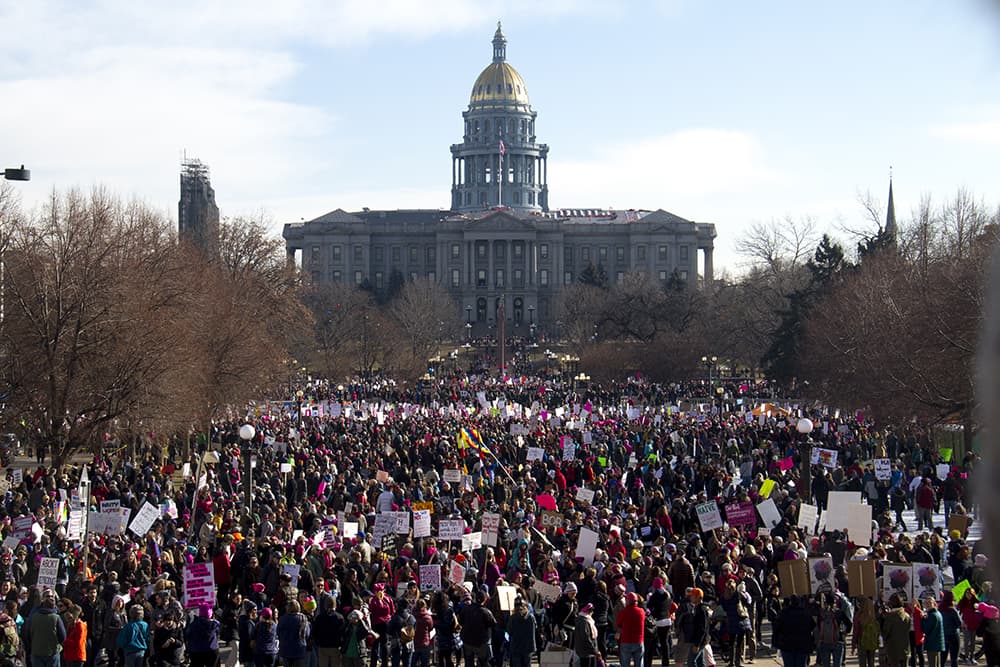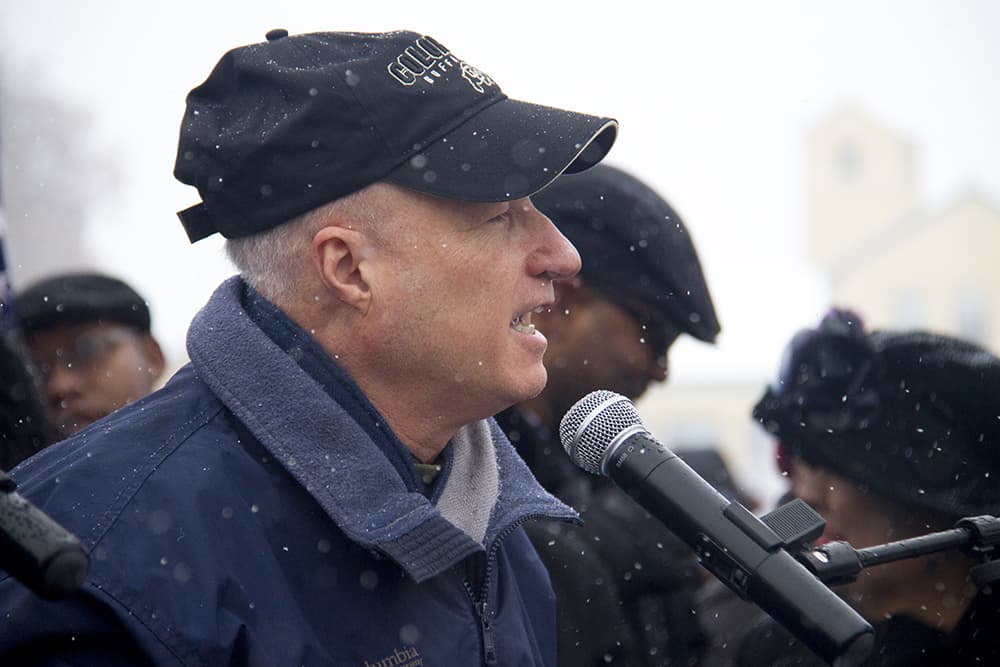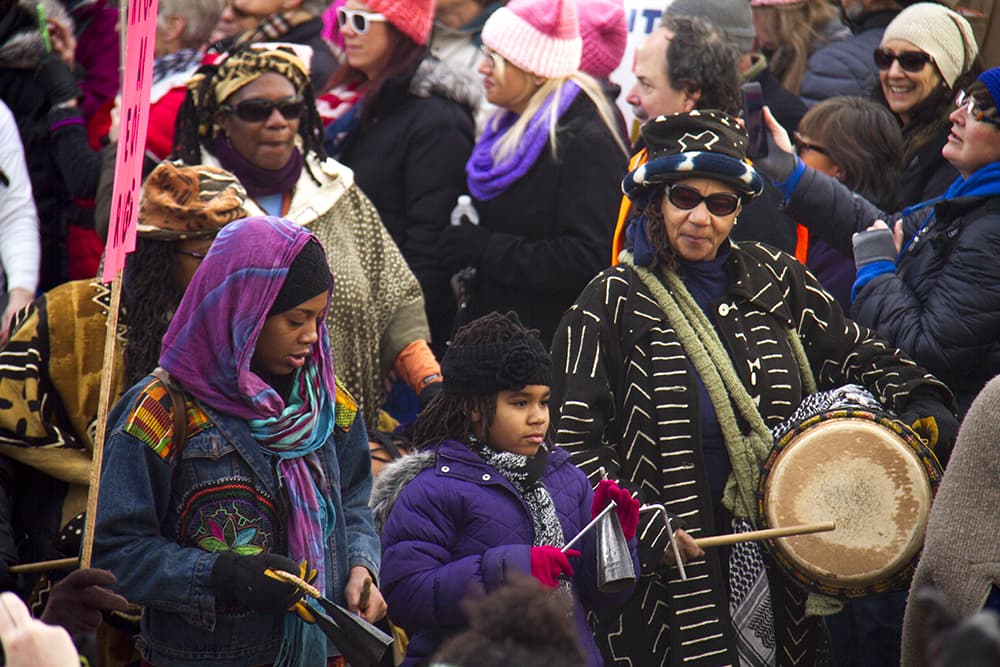
Suzie Brundage has always voted and followed the news, but by her own admission, she got “complacent” during the Obama years.
“I went to a town hall once, but I’m embarrassed to say I didn’t even know the names of my local reps,” she said.
The election of President Donald Trump came as a shock -- she compared it to going through a grief process -- but the next morning, she was online looking for groups that could help her get more involved in politics.
Brundage ended up with Indivisible Front Range, one of many groups working off the Indivisible Guide, a document written by former Democratic congressional staffers. It describes how Tea Party activists were able to be so successful in 2009 and 2010 and offers concrete steps that activists on the left can take to use the same approach for their own ends.
Now Brundage, a 32-year-old hospice social worker from Thornton, spends her evenings scouring the news and coming up with action plans that are posted and shared online. She’s taken on a small role in her local Democratic Party office, and she applied for and was appointed to Thornton’s Senior Citizen Advisory Board. She knows the names of all the elected officials who represent her and is working on meeting each of them. She marches. And she makes calls.
“I do call his office,” she said of U.S. Rep. Mike Coffman. “In D.C. and in Aurora.”
In the wake of the election, tens of thousands of Coloradans are trying to answer the question: But what can I do?
From Boulder, a small group is sending an email newsletter to hundreds of subscribers around the country that outlines "My Weekly Resistance." In Denver, Lindsay Hero launched Community Activism for Progress and Equity or CAPE as one of many spinoffs from the 4 million-strong pro-Hillary Clinton Facebook group Pantsuit Nation. CAPE creates a community around activism and tries to connect newcomers to groups already engaged around a host of issues. Members are learning how to follow issues in the state legislature and how to run for office. And there are dozens of Indivisible chapters around the state. The marches and rallies that have become the normal weekend fare in Civic Center Park are just one piece of a political awakening that those in its midst describe as unlike anything they’ve experienced before in their lives.
There is something Brundage wants elected officials to understand about these efforts. They may share guiding principles and lessons learned through a national network, but these are Colorado groups made up of Colorado voters. In addition to her full-time job, Brundage has a young daughter, a husband, two dogs, a cat and a mortgage. She’s doing this in her free time, which was already scarce.
“This group is completely filled with Colorado constituents,” she said. “We don’t have somebody saying, ‘This is going to be our call to action.’ People who cared and didn’t know what to do, we got together, and we did this.”
The question and the challenge going forward is whether this energy can be sustained into 2018 and beyond.
Can activists give Republicans pause about supporting the man their voters chose? Can they elect Democrats in the places they need to win to stop Trump’s agenda and take back Congress?
“Is this on par with the Tea Party’s beginnings? Are the intensity levels there? I wouldn’t discount it,” Republican pollster David Flaherty of Magellan Strategies said recently on his Smarter Politics podcast.
Ian Silverii, executive director of the liberal group ProgressNow Colorado, sees incredible potential.
“Organizations like mine have been waiting for a moment like this for 10 years, and we didn’t even know it,” he said. “We didn’t know there was all this progressive energy out there waiting for something terrible to happen to get active. Maybe Donald Trump will make America great again.”
The growth in social media has been a huge boon to organizing, allowing people to find each other and share information and for protest actions to be planned quickly.
And Silverii pointed to the decision by Carl’s Jr. and Hardee’s CEO Andrew Puzder to withdraw from consideration for Secretary of Labor as a sign that the resistance movement is already having an impact, even as Republicans in the Senate have confirmed all of Trump's nominees so far.
“At the end of the day, that’s a big scalp for grassroots organizers,” Silverii said. “A guy who runs a crappy fast food restaurant that doesn’t pay living wages and fights every minimum wage increase and has a questionable history with domestic violence isn’t going to be Secretary of Labor.”

But John Andrews, founder of the Western Conservative Summit and a former president of the Colorado Senate, is dismissive. He sees no signs that the movement has staying power and treating it like it does is “wishful thinking by the left and their media allies.”
“The Tea Party grew out of economic distress (blamed on both major parties) in the Great Recession,” he wrote in an email. “People demonstrated and organized in response to material harms actually occurring in the present. Demonstrations right now, the 1/21 women’s march, crowds at GOP town halls, are about lifestyle clashes potentially occurring in the future."
The Tea Party's candidates also benefited from the financial and organizational support of the Koch brothers and Americans for Prosperity. Progressives will need to tap into the equivalent resources, but there are lots of large organizations -- environmental, reproductive rights, labor unions -- invested in blocking Trump's agenda and electing more Democrats.
Where conservatives see “lifestyle,” progressives see threats to basic civil rights.
“No one has been materially harmed at this point by Trump and the GOP Congress,” Andrews wrote. “A sustained mass protest movement more readily grows out of millions slammed by foreclosures than out of a few thousand upset about bathrooms or entry visas.”
Over and over, activists told me they were concerned they or their children won’t have the same opportunities in Trump’s America because they are female, because they are not white, because they are not straight. Kaitlin Abbitt, who founded the Indivisible Longmont chapter, said her husband is mixed race and so their children are too. She’s had to confront difficult issues to help them find their way in the world.
But there’s also a real bread-and-butter issue in the form of the Affordable Care Act. Until recently, we’d mostly heard from people who were paying high premiums for high-deductible plans or people who lost plans they liked that didn’t meet the new requirements of the ACA. Now that repeal feels like a real possibility, the people who benefited from the health care law are speaking out. Abbitt’s children were born early and spent weeks in the NICU, racking up bills in the tens of thousands of dollars. The ACA got rid of lifetime limits that insurance companies used to impose, and she fears what the insurance landscape would look like without it.
“If I’m walking out of the hospital with a one-month-old baby and I’m already half-way to a lifetime limit, that’s scary,” she said.
The challenges are not just about maintaining enthusiasm or finding the right issues. They’re about geography and ideology.
FiveThirtyEight looked at how the number of participants compared for the Women’s March and the Tea Party Tax Day protests in 2009 and also where they showed up. By nearly every measure, the Women’s March was much larger, but participation was more concentrated in large cities in blue states. In some ways, this mirrors the election itself, with Clinton winning a large popular vote majority, but those votes not coming from the right states to propel her to victory.
Only 11 percent of marchers, by contrast, were in a key group of swing states — those that Obama won in 2008 or 2012 but which Clinton lost in 2016. (These states are Florida, North Carolina, Ohio, Pennsylvania, Michigan, Wisconsin, Iowa and Indiana.) Some 25 percent of tea party protesters on April 15, 2009, were in these swing states, by contrast.
We should be careful not to lose the context here. While a higher share of tea party participants were in swing states, a higher raw number of Women’s March participants were, because Women’s March participation was much higher overall.
Creating political change isn't just about U.S. Congress, Silverii said. Republicans hold the Colorado Senate by just one seat, but that slim majority blocks a lot of legislation that Democrats want, including changes like reclassifying the hospital provider fee that would free up a lot of money in the budget. There's a governor's race in 2018. And whoever controls state government after the next census will control redistricting. There's a lot at stake and a lot that progressives could do by showing up in mid-terms, even if Colorado's Congressional Republicans keep their seats.

Democrats, of course, are also looking at congressional districts with Republican representatives that were won by Clinton. In Colorado, that’s Mike Coffman’s CD6. A big part of Coffman’s pitch in 2016 was that he was not like other Republicans and that he would stand up to Donald Trump. That will mean different things to different voters, but it will almost certainly be one of the issues in 2018.
Colorado’s other Republican representatives are in pretty red districts that Trump won handily. They might be more worried about Republican primary voters who want them to support the president than about the 30 to 40 percent of their constituents who disagree with them.
But in his podcast, Flaherty cautioned against assuming that "safe" districts will always be safe. We all have our formative political moments, and one of them for him was 2006, when disgust and frustration with the perceived failures of the Bush administration led to a Democratic wave, including in supposedly safe Republican districts.
“When we were doing redistricting back in 2001 at the RNC, we thought we’d built some pretty strong districts …,” he said. “My point is when you go too far, you could plant the seeds of a wave election. Some of these districts, the bar is very high for Democrats to pick up seats in Congress. To make a strong showing, you need to bring in voters who don’t normally participate in mid-terms, and you need to be running against something. You need to be really passionate against something.”
The other example of this would be 2010, when “latent Republican voters” -- people who opted for Republicans in the general but who hadn’t been active in mid-term elections before -- showed up in large numbers and took Congress back from the Democrats.
Democrats, though, have tried and failed to take down Coffman before, and taking out any other Republican would be an even longer shot.
Abbitt's congressman is Rep. Ken Buck, a deeply conservative former prosecutor from Weld County, and she’s more focused -- for now -- on the pragmatic goal of getting him to hear the concerns of his more liberal constituents than on replacing him with a Democrat. The Indivisible group based in Castle Rock was able to secure a meeting with Buck, on the condition that the numbers were limited and the meeting was closed.
“It is really satisfying for people to see things get rowdy,” Abbitt said. “At the same time there are congressmen refusing to meet with constituents because they’re scared of that, and it might not be the most productive thing. … We want to balance the fact that people want answers and we’re not getting them.”
At the same time, she wants Republican members of Congress to have to answer for themselves on the ACA everywhere they go, just as Democrats were made to do in 2009. This issue matters a lot to people. When she sees Republicans struggling with the repeal and with what the replacement will look like, she feels like the message is getting through.
“If we can get him to budge a little, that’s something we can work with,” Abbitt said. “If he’s not responsive and won’t meet with constituents and listen, then maybe there are some other Republicans who would be more interested in representing everyone and not just registered Republicans.”
That hasn’t been the trend in Republican primaries, but there will be a wildcard in 2018 when unaffiliated voters can vote in party primaries. Proposition 107 was billed as a way to pull both parties to the center, so we’ll see how that goes.

Just as the Tea Party imposed strict litmus tests and pulled Republicans to the right, there’s pressure on Democrats to stick to the left and not cooperate with Trump. Even liberal lion Elizabeth Warren came in for scathing criticism for voting for Ben Carson for secretary of Housing and Urban Development at the committee level. (She voted no Wednesday when his nomination came to a floor vote.) It’s not clear if Democrats can enforce these lines as well as Republicans could. The districts where Tea Party insurgents replaced Republican incumbents were mostly safe Republican districts, while Democrats need to flip swing districts.
“In CD6, what’s been a big factor is who the Democrats nominate,” said Ryan Winger, director of data operations at Magellan Strategies. "If all this anti-Trump energy injects itself into a Democratic primary and they nominate someone further to the left, that could decrease their chances of taking out Coffman.”
Not everyone thinks this is a moment for pragmatism.
“A lot of people are very, very alienated from the Democratic Party as well,” said Erik Shumak, founder of Indivisible Denver. "And this was not a Democratic Party response, but a grassroots response."
To say that progressives have no choice but to support Democrats is a form of “intellectual terrorism,” he said.
“A lot of people see the Democratic Party as just as bad, and that’s not going to come around anytime soon,” Shumak said. “The Democratic Party remains a corporate entity, and people are really upset at corporations. You can say Democrats and Republicans, but you can also say capitalism is antithetical to democracy.”
At the same time, Shumak is pretty happy with U.S. Rep. Diana DeGette, the long-serving Denver Democrat, while Evan Weissman of Warm Cookies of the Revolution, a "civic health club" -- his organization works on creative community engagement and generally stays away from party politics -- volunteered to me that he wants DeGette to face a serious primary challenge from the left if she doesn’t become a lot more vocal. She has one of the safest Democratic seats in the country and no reason to hold back, he said.
Weissman raised one of the difficulties with consolidating leftist activism behind the Democratic Party in a city like Denver where Democratic politicians are also the face of rapid development and gentrification
"We have a lot of Democratic folks, social justice loving, environmental loving, nice people, but for the most part we are seduced by the economic system and seduced by development," he said. "All the shitty things that are happening are being facilitated by liberal Democrats."
Earlier this month, residents of Elyria-Swansea who are facing displacement from the I-70 widening attended a contentious meeting with CDOT and wondered where their councilman, Albus Brooks, was. He was speaking with Denver District Attorney Beth McCann at a CAPE event on criminal justice reform.
“It’s easy to be like, ‘Fuck Trump, fuck them,’ but when it comes to city politics, you get questions like, ‘Should we be a sanctuary city and what does that mean?’” Weissman said. “Or we’re cutting funding for programs and we’re giving tax credits to businesses to move here. Maybe we should have businesses pay their taxes.”
Silverii said he doesn’t think most Democratic elected officials in Colorado deserve a primary, but they also need to be paying attention.
“Time will tell, but ever since Bernie Sanders ignited a fire inside the party, smart Democratic politicians have realized this is not an element they can ignore,” he said. “This is a real political movement with real energy behind it.”
Hero, of CAPE, is not naive about the work in front of activists.
“To show up and to show up again and again and again. It's easy to show up for a march because all your friends are going and it's fun, but we need people to show up again and again and again," she said. "We are very cognizant of the fact that we cannot afford to burn out. We're not playing just for 2018.”
Update: This story has been changed to reflect that Sen. Elizabeth Warren voted no on Ben Carson's nomination for Housing and Urban Development Wednesday morning after voting in favor of advancing him out of committee earlier this year. The full name of Evan Weissman's organization has also been added to the story.










